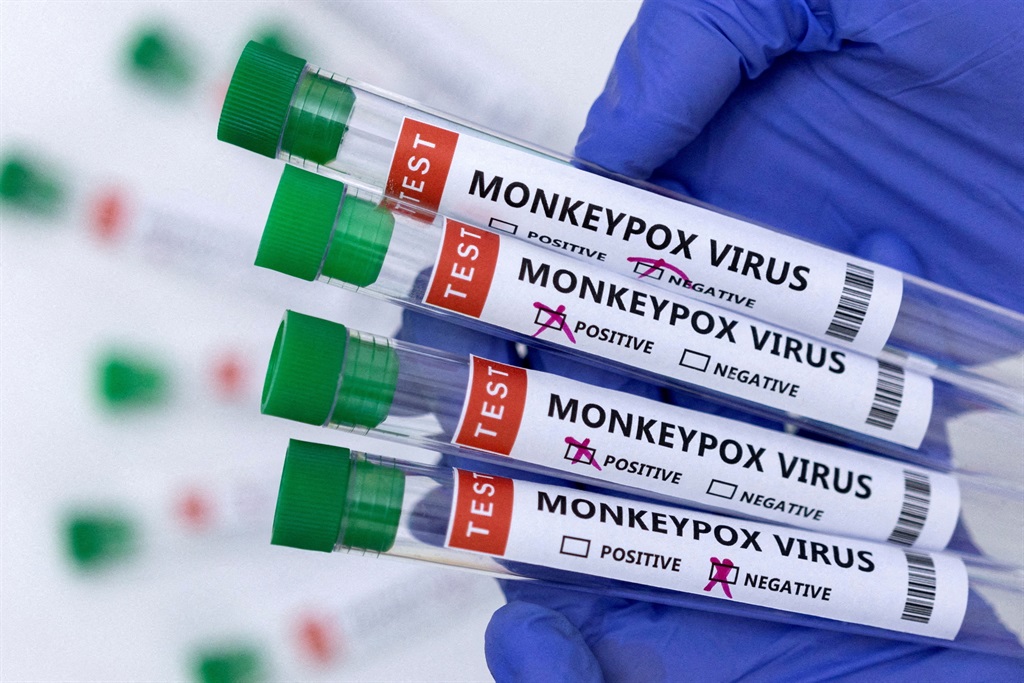
On Thursday morning, Health Minister Joe Phaahla announced that a 30-year-old man from Gauteng with no recent travel history had become the first person in South Africa to be diagnosed with monkeypox.
READ: Health Minister: Monkeypox case confirmed in Joburg while Covid-19 regulations repealed
According to a statement from the National Institute for Communicable Diseases (NICD), more than 3 000 people have been diagnosed with monkeypox since last month in several European countries, the US, Canada, Morocco and the United Arab Emirates.
According to the NICD, this is the first multicountry outbreak of the disease and is also the largest outbreak of monkeypox so far recorded.
Below are answers to 10 common questions about the virus:
1. What is monkeypox?
Dr Aida Sivro, senior scientist at the Centre for the Aids Programme of Research in SA (Caprisa), says monkeypox is caused by infection with the monkeypox virus, which belongs to the same family of viruses as the smallpox virus.
According to Sivro, there are two known types of monkeypox virus – the West African Clade and the Central African Clade. The current outbreak is caused by the less severe West African Clade. The World Health Organisation (WHO) has an extensive fact sheet on monkeypox that provides more information.
2. What are the symptoms and disease progression?
According to the WHO fact sheet, the incubation period for the disease is six to 13 days and the infection is divided into two periods, the first being characterised by general symptoms such as fever and the second by a skin rash or lesions.
Sivro explains that the symptoms of monkeypox typically include fever, headache, muscle and back pain, fatigue, swollen lymph nodes and skin rashes or lesions.
The WHO states that the rash occurs about one to three days after the fever starts and is normally found on the face and extremities (toes and fingers). The rash then becomes lesions, which progress to pustules that eventually become crusts that dry up and fall off. Symptoms can last for anything from two to four weeks.
3. How deadly is the disease?
Monkeypox is not considered to be very deadly. According to the WHO, the recent case fatality ratio (which refers to the proportion of deaths among people diagnosed with a specific disease over a certain period) has been about 3% to 6%. Severe cases are more common among children and those with immunodeficiencies. However, a range of complications can occur, including secondary infections, bronchopneumonia, sepsis, encephalitis and infection of the cornea.
4. How is it treated?
During a press briefing on monkeypox by the NICD, principal medical scientist Dr Jacqueline Weyer explained that the disease typically resolves itself without any specific interventions. She said doctors normally only treat a patient’s discomfort and symptoms such as fever and rashes. Due to the mild nature of the disease, no hospitalisation is required in most cases.
According to Sivro, there is no specific treatment for monkeypox, but due to its genetic similarity to the smallpox virus, antiviral drugs for smallpox can be used to treat it. Currently, there are two US Food and Drug Administration-approved drugs for treating smallpox, known as TPOXX (tecovirimat) and Tembexa (brincidofovir). According to the WHO, tecovirimat was licensed for the treatment of monkeypox this year, but is not yet widely available. Neither of these antivirals is listed as registered on the SA Health Products Regulatory Authority (Sahpra) website.
5. Is there a vaccine?
Sivro says there is no specific vaccine against monkeypox, but – again because it is similar to the smallpox virus – vaccines against smallpox are effective for use against it.
She explains:
Sivro adds that it is believed that if vaccination is given within four days after monkeypox exposure, it can help prevent early onset of the virus, and if vaccination is given between four and 14 days after exposure, it can make the disease less severe.
There is a candidate vaccine specifically against monkeypox that is currently being developed, according to Professor Derseree Archary, senior scientist in mucosal Immunology at Caprisa, but it is still in the early stages.
6. When and why did smallpox vaccinations stop being given in South Africa?
After smallpox was eradicated in 1980 due to a global vaccination campaign, routine vaccinations against smallpox among the general public were halted.
Archary says that while the exact date that South Africa stopped vaccinating against the disease is difficult to confirm, she believes it was in 1982.
During the NICD press briefing, Professor Adrian Puren, acting director of the NICD, said that while he was also unsure of the exact date that South Africa stopped vaccinating against smallpox, individuals younger than 40 to 50 were thought not to be immune to the virus.
Sivro adds:
7. Is the smallpox vaccine still available in South Africa?
“There are several vaccines that were previously approved for smallpox, although the disease is no longer a threat and [those vaccines haven’t] been brought into the country by those manufacturers. However, they’re included in the combination vaccines for the general immunisation programme for paediatrics,” says Yuven Gounden, spokesperson for Sahpra. However, no smallpox vaccine is listed in the childhood immunisation schedules published on the department of health’s website.
Gounden adds that Sahpra has received no submissions to date regarding plans to approve a smallpox vaccine to prevent monkeypox in South Africa.
Archary says the older-generation smallpox vaccine is registered in South Africa, but is not widely available to the public and would only be administered in very strictly monitored circumstances.
Sivro says that smallpox vaccinations are being offered in some countries to adults who have been in contact with a confirmed monkeypox case.
8. How is monkeypox transmitted?
According to the WHO fact sheet, monkeypox can be transmitted from an infected animal to humans or from one infected person to another.
Puren explains that monkeypox is much less transmissible than some other viruses and requires prolonged close contact between individuals. He adds that a person with monkeypox is thought to be contagious for about three days from the time the symptoms start until the skin where the rash or lesions appear is fully healed.
READ: Limiting sexual partners can help to avoid monkey pox infection
Archary says that due to the DNA of the monkeypox virus being very stable on surfaces, clothes and bed linen contaminated by an infected person can spread the disease. Close personal contact or skin-to-skin contact with the rash of an infected person, as well as respiratory secretions (for example, the infected person sneezing on someone) could also transmit the virus.
9. Do condoms reduce the risk of contracting monkeypox?
The method of transmission makes it unlikely that condoms would prevent the spread of monkeypox during sexual intercourse. Sivro says it is currently unclear whether the virus can spread through semen or vaginal fluids.
However, because of the skin-to-skin contact and fluid exchange during sexual intercourse, condoms would not be protective against monkeypox, says Archary.
10. Why does monkeypox appear to be more prevalent among men who have sex with men (MSM)?
During Thursday’s press briefing, Phaahla stated that while the majority of cases in the current outbreak were among MSM, it was crucial not to misunderstand this statement.
Weyer explained that there was no evidence that there was a different biological susceptibility to the monkeypox virus and there was no “selection” by the virus in terms of the group of people being infected from that perspective. Instead, it was likely that the outbreak occurring among MSM was coincidental.
Archary cautioned against the belief that monkeypox was found among MSM and bisexual men because it was likely to be misinterpreted by the public and could cause stigma against these groups.
She said:
*This article was published by Spotlight – health journalism in the public interest
| ||||||||||||||||||||||||||||||
 |




 Publications
Publications
 Partners
Partners










